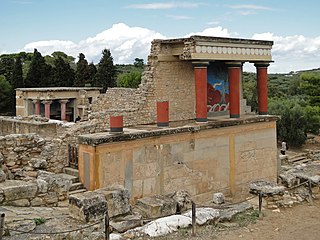Related Research Articles

Alyattes, sometimes described as Alyattes I, was the fourth king of the Mermnad dynasty in Lydia, the son of Sadyattes, grandson of Ardys, and great-grandson of Gyges. He died after a reign of 57 years and was succeeded by his son Croesus.

Herodotus was an ancient Greek historian and geographer from the Greek city of Halicarnassus, part of the Persian Empire and a later citizen of Thurii in modern Calabria (Italy). He is known for having written the Histories – a detailed account of the Greco-Persian Wars. Herodotus was the first writer to perform systematic investigation of historical events. He is referred to as "The Father of History", a title conferred on him by the ancient Roman orator Cicero.

Lydia was an Iron Age kingdom of western Asia Minor located generally east of ancient Ionia in the modern western Turkish provinces of Uşak, Manisa and inland Izmir. The ethnic group inhabiting this kingdom are known as the Lydians, and their language, known as Lydian, was a member of the Anatolian branch of the Indo-European language family. The capital of Lydia was Sardis.

Gyges was the founder of the Mermnad dynasty of Lydian kings and the first known king of the Lydian kingdom to have attempted to transform it into a powerful empire.

Knossos is the largest Bronze Age archaeological site on Crete and has been called Europe's oldest city.
In Greek mythology, Dascylus or Daskylos is a name that may refer to:
Gelon also known as Gelo, son of Deinomenes, was a Greek tyrant of the Sicilian cities Gela and Syracuse, and first of the Deinomenid rulers.
Sadyattes was the third king of the Mermnad dynasty in Lydia, the son of Ardys and the grandson of Gyges of Lydia.

The Ionian Revolt, and associated revolts in Aeolis, Doris, Cyprus and Caria, were military rebellions by several Greek regions of Asia Minor against Persian rule, lasting from 499 BC to 493 BC. At the heart of the rebellion was the dissatisfaction of the Greek cities of Asia Minor with the tyrants appointed by Persia to rule them, along with the individual actions of two Milesian tyrants, Histiaeus and Aristagoras. The cities of Ionia had been conquered by Persia around 540 BC, and thereafter were ruled by native tyrants, nominated by the Persian satrap in Sardis. In 499 BC, the tyrant of Miletus, Aristagoras, launched a joint expedition with the Persian satrap Artaphernes to conquer Naxos, in an attempt to bolster his position. The mission was a debacle, and sensing his imminent removal as tyrant, Aristagoras chose to incite the whole of Ionia into rebellion against the Persian king Darius the Great.

Aristagoras, d. 497/496 BC, was the leader of the Ionian city of Miletus in the late 6th century BC and early 5th century BC and a key player during the early years of the Ionian Revolt against the Persian Achaemenid Empire. He was the son-in-law of Histiaeus, and inherited the tyranny of Miletus from him.

Candaules, also known as Myrsilos (Μυρσίλος), was a king of the ancient Kingdom of Lydia in the early years of the 7th century BC. According to Herodotus, he succeeded his father Meles as the 22nd and last king of Lydia's Heraclid dynasty. He was assassinated and succeeded by Gyges.

The Lydians were Anatolian people living in Lydia, a region in western Anatolia, who spoke the distinctive Lydian language, an Indo-European language of the Anatolian group.
Agron was a legendary king of Lydia who is named by Herodotus as the first of the Lydian Heraclid dynasty. Before he assumed the throne, the ruling family had been the Maeonian line of Lydus, from whom the country's name was derived. According to Herodotus, the Heraclid dynasty in Lydia reigned continuously through 22 generations for 505 years. The last of the line was Candaules, whose date of death was c.687 BC, so Herodotus' computation suggests c.1192 BC for Agron's accession.
Ardys was the son of Gyges of Lydia, whom he succeeded as the second king of the Mermnad dynasty.
Atys is a legendary figure of the 2nd millennium BC who is attested by Herodotus to have been an early king of Lydia, then probably known as Maeonia. He was the son of Manes and the father of Lydus, after whom the Lydian people were later named.
Dorieus was a Spartan prince of the Agiad dynasty who is mentioned several times in Herodotus. The second son of Anaxandridas II, he was the younger half-brother of Cleomenes I and the elder full brother of both Leonidas I and Cleombrotus. He tried to found a colony in Libya but failed. He tried again to establish a colony in western Sicily, but was killed by the Carthaginians.
In Greek mythology, Iardanus is a semi-legendary figure who was the father of Omphale, queen of the people who were formerly called Maeonians, but later Lydians. According to legend, he bought Heracles as a slave. Herodotus implies that Iardanus was a Maeonian king of Lydia.

There is evidence of mercenaries being hired in Ancient Greece from the 6th century BC. The tyrants of that time hired bodyguards from other city-states. It is not known if earlier Aegean armies and navies, such as the Minoans and Mycenaeans, used mercenaries.
References
- ↑ Herodotus 1975 , p. 43, I.7
- ↑ Bury & Meiggs 1975 , p. 82